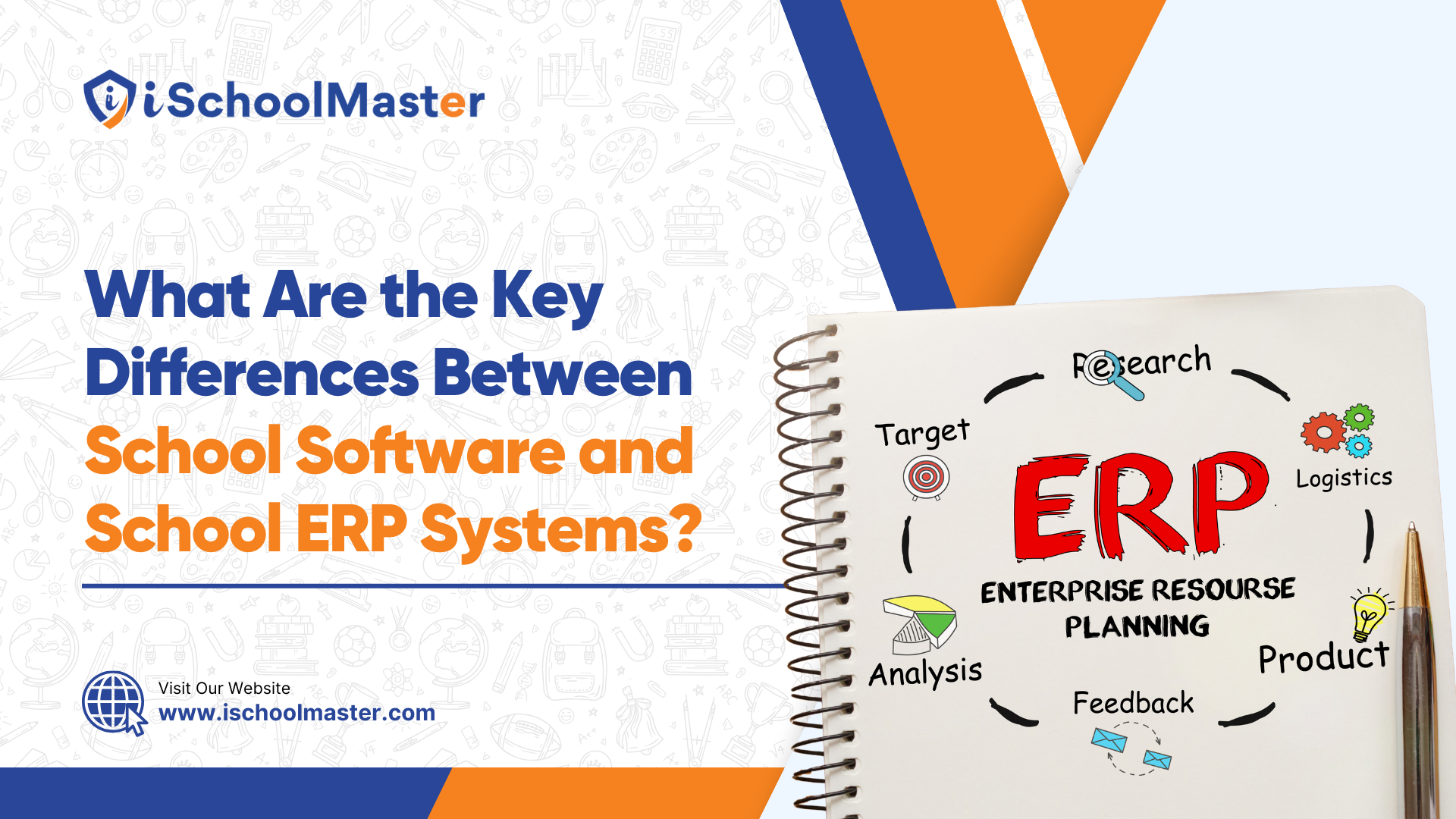Table of Contents
To improve efficiency, streamline administrative functions, and enhance communication, educational institutions have turned to software solutions. There are two primary categories of educational software solutions: school ERP systems and school software; both can aid schools in optimizing their operations, but each has distinct scopes, capabilities, and scale. This article can help schools choose the appropriate solution for their needs.
Grasping School Software
School management software is often used to describe school software. This software addresses specific needs in educational institutions. These software solutions automate and streamline administrative tasks such as attendance tracking and grade management. They also help with scheduling and communication. These software solutions are easy to use and implement. They are accessible to all schools.
The Core Features of School Software
Attendance management: School software allows administrators to record and manage attendance efficiently. Its features encompass automated attendance tracking and absence notifications.
Gradebook Management: Teachers can make use of Gradebook Management. They can input and manage student grades. The feature has the power to do grade calculations, grade weightings, and the generation of progress reports.
Scheduling and Timetable Management: School software helps create and manage class schedules and times. Administrators can assign teachers and classrooms to students, and adjust the schedule accordingly.
Communication Tools: Communication is important in school management. School software helps teachers and admins have collaboration tools like messaging systems, email integration, and notifications. With them, they can communicate properly and interactions between teachers, parents, and students become smoother.
Library Management: Many school software packages include features to manage library resources such as cataloging books, managing circulation, and tracking late items.
Fee Management: School software includes modules for fee management that facilitate efficient tracking and collection of student fees. These modules often have features such as fee schedules, billing, and financial reports.
Exploring School ERP Systems
School ERP systems offer an integrated and comprehensive approach to managing diverse educational functions. ERP systems, unlike school software that focuses on a specific area, are designed to centralize all aspects of management in schools, from academics to administrative functions. These systems are complex and include a wide range of functions to meet the needs of modern education institutions.
The Core Modules for School ERP Systems
Student Information System: At the core of every ERP system for schools lies this module, which manages comprehensive student data including personal details, academic performance and attendance records, behavioral patterns, and personal preferences.
Human Resource Management (HRM): It’s a module integrated into school ERP systems that allows administrators to oversee staff recruitment, payroll processing, attendance tracking, and evaluation processes.
Finance and Accounting: ERP systems automate financial processes like budgeting and accounts payable/receivable. In addition, they manage payroll and provide financial reports.
Admissions and Enrollment Management: This module facilitates the complete management of admissions processes from application submission online through enrollment, payment, and verification documents.
Academic Management: The ERP system's academic management modules encompass curriculum administration, lesson plan development, and assessment management as well as
Analytic reporting capabilities. ERP systems contain modules for tracking school inventory such as books, equipment, and assets. This automates procurement, asset tracking, and inventory monitoring.
Transport Management: With the help of this module, schools can easily manage transportation operations. Route planning, vehicle tracking, and managing transportation-related expenses become possible with this.
ERP Systems Foster Collaboration Between Parents and Teachers: ERP systems are known to make collaboration among parents, teachers, and students perfect. Are you wondering how it does that? Mobile apps or portals are available where parents can connect with teachers directly. Apart from this, they can access student information and stay updated on the academic progress of their children.
The Differences between School ERP and School Software
Scope and Integration of School ERP Systems and School Software - The main distinction between school ERP systems and school software lies in their level of integration and scope; ERPs tend to offer more comprehensive coverage whereas school software specializes in features like gradebook or attendance management.
Complexity and Customization - School ERP systems tend to require more customization and be more complex, as they must adapt to fit the unique needs of every educational institution. Conversely, school software solutions typically have less options for customization options and therefore fewer customization needs.
Scalability- ERP systems are built to accommodate educational institutions as they grow, from small private schools to multicampus institutions of any size. Unfortunately, school software solutions often do not have sufficient scalability capabilities that meet the growing educational institutions' needs.
Cost and Affordability- School software solutions typically are more affordable than ERP due to their smaller scope and lower level of complexity, however, their total costs may be justified due to their extensive functionality and potential long-term gains in efficiency.
Implementation and Training- The software for schools tends to be easier for users to implement and train than ERP systems due to their ease of implementation, configuration, and training needs. Because of their complex nature and scope, ERPs may require more planning, configuration, and training effort from all involved.
Conclusion of Article
While school software solutions and ERP systems are a part of school management systems that aim to increase efficiency and effectiveness in educational institutions, their scope, functionality, and scale vary considerably. ERPs encompass all aspects of school administration from academics to administrative duties while school software specializes in certain needs like attendance management, grade book management, or communication. When making a selection, between these options, schools must carefully consider their budget, scalability requirements, and long-term goals when making an informed decision.
Author - Rohan Nanda
Rohan Nanda is a seasoned content writer with 9 years experience in school management system, school software and erp solution content across multiple formats. He leverages his skills in crafting curated content on the school management system. In his personal time, He enjoys reading article and being up-to-date on trends in school erp technology.

